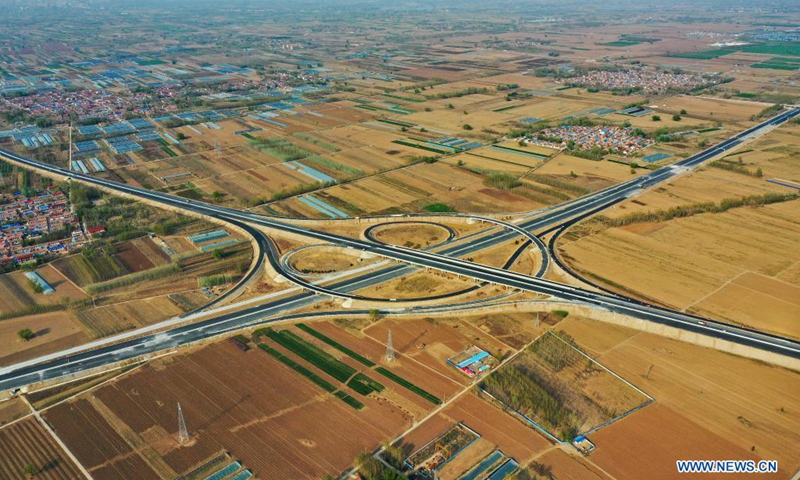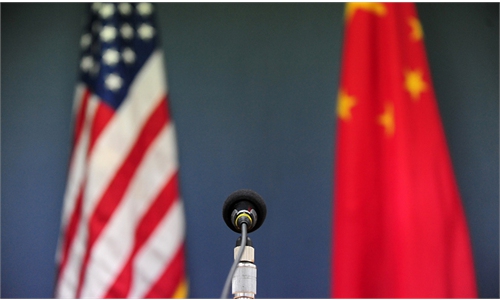
Aerial photo taken on April 7, 2020 shows the construction site of the Beijing-Dezhou expressway in north China's Hebei Province. The first phase of the expressway linking Beijing Daxing International Airport and Dezhou City in Hebei is expected to be put into operation in May 2021.(Photo: Xinhua)
What will China eventually become? Will China be able to fulfill Western expectations? Will China be a destructive or constructive world power? Carry the status-quo or become revisionist? A force for continuity or a force for change? Today, the world is witnessing an interesting phenomenon. The Western world in general, and the US in particular, is suffering from the "China syndrome" in the context of China's global rise.
The "China syndrome" refers to a set of symptoms characterized by psychological anxiety, emotional hysteria, and expressive demonization. In recent years in Western media and academia, the coverage of China can be characterized either by exaggerated prophecy of China's threatening rise to the superpower status, or by unwarranted forecast of the "the coming collapse of China," or by doomed prediction about "the endgame of Communist rule in China." From time to time Western academics, politicians and opinion-makers selectively use the ups and downs of China's development trajectory to justify their pre-set theories and ideologies. They portray China as a threat, a place about to collapse, or a superpower. The West has difficulty to conceptualize, analyze and deal with China's rise outside of the frameworks that it feels familiar and comfortable with.
Today, there is widespread anxiety in the West that China is on its way to become one of the dominant powers in the world order. The West longed for an expected "liberal China" or an imagined "West-like China" brought about and shaped by globalization, marketization, and westernization. But their fantastic have been driven into despair. Now, they have viewed China as a "systemic rival."
The West's unease is understandable. But what are the essential causal factors that built up the West's anxiety? According to my analysis, China's economic competitiveness and technological advance are not the essence of the problems in China-West relationships. After all, the West has been benefitting from China's economic rise. Also, China is emerging to become the largest consumer market for Western products. Rather, the West's anxiety toward China is caused by the fact that the outcome of China's economic success and its modernization process do not conform to a set of belief paradigms in the West derived from the historical evolution of European modernization. These paradigms prophesize a number of presumed causal relationships.
The first is the "modernization paradigm." It believes that liberal democracy is an unavoidable outcome of economic modernization caused by the forces of secularization, individualism and liberalism. The second is the "middle class paradigm." It claims that the middle class is the agent of liberal democracy; and liberal democracy is an inevitable consequence brought about by the rise of middle class based interest groups. This leads to pluralism and multiparty competition. The third is the "political authoritarianism paradigm." It teaches that economic underdevelopment is caused by political authoritarianism's lack of freedom and free flow of ideas, which leads to a lack of innovation and upward mobility.
These paradigms were seemingly vindicated by the end of the Cold War, an analogy to the triumph of Western liberal hegemony and market capitalism. Since then, the "end of history" of the Western belief system has been seen as per definition the truth. It is viewed as natural law for humanity's common destiny.
Ironically, China's global rise for the past four decades has not led the country toward a Western style liberal democracy. The Chinese middle class has not really become the "agent of liberal democracy" as the West always anticipates. The most obvious paradox is the fact that the so-called "Chinese authoritarianism" coined by the West has transformed the country from one of the world's poorest countries into the world's second-largest economy. The whole world has been impressed by Chinese creativities and innovations in recent years. This has been characterized by great economic, financial, technological and scientific innovations and achievements. The follows are the research findings and public opinion data from the West in the recent years.
The Harvard University's findings indicate that Chinese citizen satisfaction with government has increased virtually across the board. This satisfaction is largely based on the improvement that the Chinese government has made in three key areas: social security, anti-corruption, and environmental protection.
A multi-country poll from the Ipsos Public Affairs Survey finds that China is the most optimistic country in the world. Chinese adults and youth are the most optimistic across the study about the future of their country; with 88 percent of adults and 94 percent of youth. Regarding their attitude toward "the future of the world," they also show relative optimism with 85 percent of adults and 90 percent of youth.
Another study by the Edelman Trust Barometer shows that across international comparisons for many years, the Chinese government has enjoyed the highest trust by Chinese people. For example, 84 percent between 2017-2018. Public trust in the Chinese government has risen to 95 percent during the coronavirus pandemic, which is the top of the 11 countries covered.
Thus, the essence of the West's China syndrome can be traced to the "loss of China" sentiment. Historically, the "loss of China" took its initial shape when the Chinese Nationalists were defeated in the civil war and fled to Taiwan in 1949, and when Mao Zedong proclaimed the "standing up of the Chinese nation." The wishful thinking about the imminent transformation of China into a Western-like democratic, capitalist nation has evaporated into air.
During the 1950s, America experienced "McCarthyism," a term referring to the practice of making accusations of subversion or treason without proper regard for evidence. It was characterized by heightened political repression and a campaign spreading fear of communist influence on American institutions and of espionage.
Do we see a similar situation of McCarthyism in the US today? Let's see: reducing the number of Chinese media and journalists, banning Chinese students from choosing certain areas of education, accusing Huawei for "national security" threat without concrete evidence, closing down Confucius Institute for avoiding "Chinese political influence," and demonizing China for dealing with its internal affairs, attempting to restore an anti-China international coalition, etc. Sounds pretty China paranoid, doesn't it?
Ever since Napoleon warned the West that it would be better not to wake the "sleeping giant," China has been a source of fascination and opportunities, as well as uncertainties and disturbance, for the existing West-dominated world order. Even after China became an integral part of the world economy in the late 1970s, it is still a country that the West finds difficult to accommodate. China now finds itself to be a "middle kingdom" surrounded by multiple sentiments of jealousy, admiration, anxiety, worry and even resentment. Within the near future, China as the rising power and the West as the established power will have to find ways to accept each other. In order to do so, both sides will have to go through a considerable period of struggle, tension, adjustment and accommodation.
Li Xing is a professor with Department of Politics and Society, Aalborg University, Denmark, and Peng Bo is assistant researcher with Institute of World Economics and Politics, Chinese Academy of Social Sciences. opinion@globaltimes.com.cn


